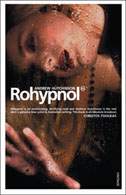 | Andrew Hutchinson ROHYPNOL Vintage, 246 pp. Source: review copy Review by Perry Middlemiss |
Let me say at the outset that this novel is not a light or easy read: the situations portrayed are unpleasant and unsettling, and the characters that inhabit the book are completely unlikeable. When you get to the end it's hard to say that you've actually enjoyed it. But readers who leave this novel repelled by the material will only have seen the surface layer of what this book has to offer. It would be an common enough response to the work, and it is one that I would have some sympathy with. Yet, in doing so, the reader would be missing an important ingredient of Rohypnol, one that lifts it above the general ruck.
Troy, Uncle, Thorley, and the novel's narrator, are a group of disaffected teenagers who have fallen in together for a variety of reasons, and have formed, for want of a better term, a "date-rape" gang. Their favourite mode of operation is for one of their number to spike the drink of a pre-determined target, in a dark pub or nightclub, with Rohypnol, and then to spirit the victim away from the scene and back to an apartment where the sexual assault takes place. The story of the four is told from the point of view of the unnamed narrator, who starts the novel in therapy, fantasising about the therapist and attempting to forestall any form of analysis by her. We are aware early on that something bad has happened; we're not sure what, though it's not hard to figure out. The point of the book is not so much what took place, but how the protagonists got to the state that it could happen.
What we are shown here is the story of teenagers severely out of touch with the society in which they live, and divorced from their own humanity. They appear like predators, circling their prey and waiting for the right time to pounce. Are they really animals, or just disaffected youth who have taken the wrong path? They certainly display a number of sociopathic tendencies: lack of empathy, and control of their own actions being not the least of them. As I said earlier, the characters in the novel are completely unsympathetic, but Hutchinson has hit on a method of making the reader keep turning the pages; searching, I suppose, for some form of redemption or cathartic outcome. In many ways the novel reads like pulp noir fiction: short simple sentences, clipped dialog, short chapters that jump focus and time. There is little or no reflection on the action of the book by the narrator. The only sense of the narrator's purpose comes from several manifesto-like utterances spread throughout the book:
The New Punk is about intelligence...The New Punk is about raiding the twentieth century to make something new...The New Punk is about taking control. Seeing what you want and taking it, no matter the cost...The New Punk is not about remorse...The New Punk is not about moving towards your future. It is about your life right now, impatiently standing still.I don't think these work. They add little to the reader's understanding of the novel's philosophy and break the flow of the story. Better is Thorley's explanation of "the rules", the first of which reads: "Never use your real name." Incorporated directly into the story they have more power. It's hard not to be reminded of Chuck Palahniuk's Fight Club, at this point, which also laid down a set of rules for its participants: "The first rule of Fight Club is never talk about Fight Club."
Various commentators on this book have been critical of it for what they see as an attempt to shock, concentrating on the actions of the characters and the author's alleged "overuse" of swearing in the dialog. Yes, there are a lot of obscenities used in the book, but I've heard worse at the football and in the pub, so I didn't find the swearing here to be overdone nor repulsive. A certain sense of authenticity is required in a work of this sort and I'd rather this approach than one that was obviously toned down to little effect, or that attempted to replicate a form of slangy jargon. I do, in fact, feel that Hutchinson showed a degree of restraint at times and might well have shovelled the swearing on even harder. Does that forgive his use of swearing? No, because there is, in my mind, nothing to forgive. It fits the story and that's all that counts. It does, however, show that he was aware of the effect he was attempting to achieve and didn't just allow the thing to run out of control.
The most shocking thing about this book is the fact that people like these actually exist. If the main purpose of any novel is to propel us into a world outside our own experience then this one succeeds. It will certainly not be to everyone's taste, but I suspect you won't forget it in a hurry.
